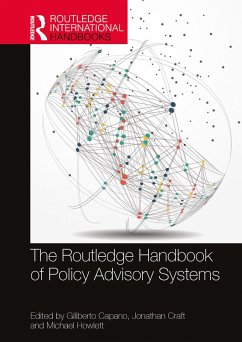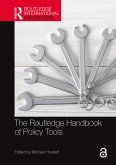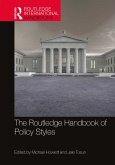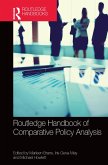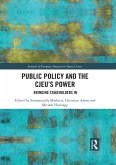The Routledge Handbook of Policy Advisory Systems (eBook, PDF)
Redaktion: Capano, Giliberto; Howlett, Michael; Craft, Jonathan


Alle Infos zum eBook verschenken

The Routledge Handbook of Policy Advisory Systems (eBook, PDF)
Redaktion: Capano, Giliberto; Howlett, Michael; Craft, Jonathan
- Format: PDF
- Merkliste
- Auf die Merkliste
- Bewerten Bewerten
- Teilen
- Produkt teilen
- Produkterinnerung
- Produkterinnerung

Hier können Sie sich einloggen

Bitte loggen Sie sich zunächst in Ihr Kundenkonto ein oder registrieren Sie sich bei bücher.de, um das eBook-Abo tolino select nutzen zu können.
This handbook comprehensively reflects, presents and summarises both first and second wave scholarship into policy advisory systems (PAS). Bringing together leading scholars to engage persistent as well as emergent themes, the handbook provides a single volume highlighting both classic and new directions for PAS research, summarising both existing knowledge and outlining possible future findings.
Covering the activities of a range of advisory system members from think tanks to public services, this handbook examines a broad set of administrative traditions and institutions affecting such…mehr
- Geräte: PC
- mit Kopierschutz
- eBook Hilfe
- Größe: 14.47MB
![The Routledge Handbook of Policy Tools (eBook, PDF) The Routledge Handbook of Policy Tools (eBook, PDF)]() The Routledge Handbook of Policy Tools (eBook, PDF)44,95 €
The Routledge Handbook of Policy Tools (eBook, PDF)44,95 €![The Routledge Handbook of Policy Styles (eBook, PDF) The Routledge Handbook of Policy Styles (eBook, PDF)]() The Routledge Handbook of Policy Styles (eBook, PDF)43,95 €
The Routledge Handbook of Policy Styles (eBook, PDF)43,95 €![The Routledge Handbook of LGBTQIA Administration and Policy (eBook, PDF) The Routledge Handbook of LGBTQIA Administration and Policy (eBook, PDF)]() The Routledge Handbook of LGBTQIA Administration and Policy (eBook, PDF)43,95 €
The Routledge Handbook of LGBTQIA Administration and Policy (eBook, PDF)43,95 €![Routledge Handbook of Comparative Policy Analysis (eBook, PDF) Routledge Handbook of Comparative Policy Analysis (eBook, PDF)]() Routledge Handbook of Comparative Policy Analysis (eBook, PDF)45,95 €
Routledge Handbook of Comparative Policy Analysis (eBook, PDF)45,95 €![The Routledge Handbook of Smuggling (eBook, PDF) The Routledge Handbook of Smuggling (eBook, PDF)]() The Routledge Handbook of Smuggling (eBook, PDF)0,00 €
The Routledge Handbook of Smuggling (eBook, PDF)0,00 €![Public Policy and the CJEU's Power (eBook, PDF) Public Policy and the CJEU's Power (eBook, PDF)]() Public Policy and the CJEU's Power (eBook, PDF)41,95 €
Public Policy and the CJEU's Power (eBook, PDF)41,95 €![Health Care Policy and Opinion in the United States and Canada (eBook, PDF) Health Care Policy and Opinion in the United States and Canada (eBook, PDF)]() Richard NadeauHealth Care Policy and Opinion in the United States and Canada (eBook, PDF)41,95 €
Richard NadeauHealth Care Policy and Opinion in the United States and Canada (eBook, PDF)41,95 €-
-
-
Covering the activities of a range of advisory system members from think tanks to public services, this handbook examines a broad set of administrative traditions and institutions affecting such systems in democratic, developing, authoritarian political regimes, and in supranational and transnational governance arrangements. It focusses on the systematic interactions of the supply, demand and brokerage of policy advice in different jurisdictions, and shows how these systems operate and evolve.
The Routledge Handbook of Policy Advisory Systems is essential reading and an authoritative reference for scholars, students, researchers and practitioners of public policy, public administration, and public management. Those interested in comparative politics and government, international and public organisations and the use, influence and impact of policy advisory systems in a range of policy domains will find its comprehensive scope and coverage of great benefit.
Dieser Download kann aus rechtlichen Gründen nur mit Rechnungsadresse in A, B, BG, CY, CZ, D, DK, EW, E, FIN, F, GR, HR, H, IRL, I, LT, L, LR, M, NL, PL, P, R, S, SLO, SK ausgeliefert werden.
- Produktdetails
- Verlag: Taylor & Francis eBooks
- Seitenzahl: 696
- Erscheinungstermin: 30. September 2025
- Englisch
- ISBN-13: 9781040407608
- Artikelnr.: 75432094
- Verlag: Taylor & Francis eBooks
- Seitenzahl: 696
- Erscheinungstermin: 30. September 2025
- Englisch
- ISBN-13: 9781040407608
- Artikelnr.: 75432094
- Herstellerkennzeichnung Die Herstellerinformationen sind derzeit nicht verfügbar.
Approaches Part 1: Policy Advisory Systems in a Changing World: Concepts,
Importance and The State of the Research Section I - Introduction
(Background and Problematic) 1. A Diversifying Market for Public Policy
Advice: Demand, Supply and the Challenges of AI-Generated Government Advice
2. Policy Advice and the Public Service in a Changing World 3. Citizens as
Policy Advisors: Public Opinion as Policy Advice 4. The State of the Art of
Policy Advisory System Research: Mapping of Performance, Themes, and Key
Actors of the Field Part 2: Policy Advisory System Basics: Composition,
Location and Dynamics Section I: PAS Composition: The Nature of Policy
Experts and Policy Advice 5. Location and Content in Policy Advisory
Systems 6. Actors in Policy Advisory Systems: Instrument Constituencies,
Epistemic Communities 7. Policy Advice by Bureaucrats 8. The Role and Types
of Expert Bodies in Policy Advisory Systems Section II - PAS Locations:
National, Sub-National and International 9. Moving beyond Westminster:
Expansion and comparison in the study of national policy advisory systems
10. Why Study Sub-national Policy Advisory Systems? 11. Policy advisory
systems at the nexus between policy areas 12. How Do International
Bureaucrats Affect Policy Outputs? Studying Administrative Influence
Strategies in International Organizations Section III - Changes in PAS
Membership and Activities 13. Policy Advisory System Dynamics: Changes in
the Nature of Policy Advisors and Advice in Contemporary Government 14.
Political demand and policy advice: A framework for analysis 15. Ideational
change in Policy Advisory Systems: The role of external advisors in
fostering professional expertise in Public Administration 16. The
governance of policy advisory systems: Comparison of OECD countries Part 3:
PAS Trends: Politization, Externalization and Internationalization Section
I - Politicization: Changes in PAS Components 17. Ministerial Advisers and
Policy Advisory Systems 18. The 'mixed bag' of ministerial advisers:
Reflecting on their role profiles in the policy advisory system 19. The
Hearts and Brains of Policy Advisory Systems: Ministerial Advisers,
Ministerial Offices and Executive Triangles 20. Public inquiries as
advisory policy tools Section II - Externalization: Changes in Non-State
Actors 21. Externalization of policy advice: From inside to outside
government (and back?) 22. Think tanks and strategic policy-making: The
contribution of think tanks to policy advisory systems 23. Professionals in
global tax battles: Powering ideas through expertise 24. Academics in the
Policy Advisory System: Evidence from a Survey of Canadian Universities
Section III - Internationalization: The Changing Role of International
Organizations in PAS 25. The role of the International Monetary Fund in
policy advisory systems 26. The boundary work of international
organizations: Exclusive expertise 27. The OECD's Emulationist and the
World Bank's Universalist Approach to Policy Brokerage: A Matter of Style
28. The Demand for Advice at the European Union Level: Policy Advice
Politicization in the European Commission Part 4: Variations and
Developments in National Structure and Behavior Section I - PAS in Higher
Capacity Countries 29. Transformation in Whitehall policy advice systems?
Learning from three decades of reform 30. Policy Advise Paradoxes in
France: So many advisors, experts and courtesans speaking (un-)true to
power in a vertical 'republican monarchy' 31. Dynamics of change in
internal policy advisory systems: The hybridization of advisory capacities
in Germany 32. Providing Advice to Australian Government Section II - Cases
of Lower Capacity Countries 33. The Involution of Policy Advisory System in
Russia: Formation, Development, and Degradation 34 The Iranian Policy
Advisory System: Marginal Externalization and Political Conservatism 35.
Policy Advisory System in Turkey: Policy Advice in an Authoritarian Setting
36. Knowledge representation of national expert and advisory committees in
China Part 5: Future Trends in PAS Research and Practice Section I - Issues
in PAS Management and Quality 37. Theorizing PAS Management: New Directions
and Old Haunts 38. Understanding the connection between government and
policy advisory bodies at arm's length: Contested Autonomy 39. Features
informing the development of an optimal policy advisory system: Based on
the best available advice? 40. What Makes a Good Policy Advice System? The
Effects of Exit, Voice and Loyalty on Advisory System Diversity Section II
- Future Issues in PAS Research 41. Tempo, Intensity, and Sequence in
Policy Advisory Systems: In Search of More Nuanced Dynamics 42. The
Challenges of Policy Advice in Turbulent Era: Legitimacy, Values and
Politics 43. Advising Ministers in the digital era 44. Reconsidering advice
and advisory systems in the governance era
Approaches Part 1: Policy Advisory Systems in a Changing World: Concepts,
Importance and The State of the Research Section I - Introduction
(Background and Problematic) 1. A Diversifying Market for Public Policy
Advice: Demand, Supply and the Challenges of AI-Generated Government Advice
2. Policy Advice and the Public Service in a Changing World 3. Citizens as
Policy Advisors: Public Opinion as Policy Advice 4. The State of the Art of
Policy Advisory System Research: Mapping of Performance, Themes, and Key
Actors of the Field Part 2: Policy Advisory System Basics: Composition,
Location and Dynamics Section I: PAS Composition: The Nature of Policy
Experts and Policy Advice 5. Location and Content in Policy Advisory
Systems 6. Actors in Policy Advisory Systems: Instrument Constituencies,
Epistemic Communities 7. Policy Advice by Bureaucrats 8. The Role and Types
of Expert Bodies in Policy Advisory Systems Section II - PAS Locations:
National, Sub-National and International 9. Moving beyond Westminster:
Expansion and comparison in the study of national policy advisory systems
10. Why Study Sub-national Policy Advisory Systems? 11. Policy advisory
systems at the nexus between policy areas 12. How Do International
Bureaucrats Affect Policy Outputs? Studying Administrative Influence
Strategies in International Organizations Section III - Changes in PAS
Membership and Activities 13. Policy Advisory System Dynamics: Changes in
the Nature of Policy Advisors and Advice in Contemporary Government 14.
Political demand and policy advice: A framework for analysis 15. Ideational
change in Policy Advisory Systems: The role of external advisors in
fostering professional expertise in Public Administration 16. The
governance of policy advisory systems: Comparison of OECD countries Part 3:
PAS Trends: Politization, Externalization and Internationalization Section
I - Politicization: Changes in PAS Components 17. Ministerial Advisers and
Policy Advisory Systems 18. The 'mixed bag' of ministerial advisers:
Reflecting on their role profiles in the policy advisory system 19. The
Hearts and Brains of Policy Advisory Systems: Ministerial Advisers,
Ministerial Offices and Executive Triangles 20. Public inquiries as
advisory policy tools Section II - Externalization: Changes in Non-State
Actors 21. Externalization of policy advice: From inside to outside
government (and back?) 22. Think tanks and strategic policy-making: The
contribution of think tanks to policy advisory systems 23. Professionals in
global tax battles: Powering ideas through expertise 24. Academics in the
Policy Advisory System: Evidence from a Survey of Canadian Universities
Section III - Internationalization: The Changing Role of International
Organizations in PAS 25. The role of the International Monetary Fund in
policy advisory systems 26. The boundary work of international
organizations: Exclusive expertise 27. The OECD's Emulationist and the
World Bank's Universalist Approach to Policy Brokerage: A Matter of Style
28. The Demand for Advice at the European Union Level: Policy Advice
Politicization in the European Commission Part 4: Variations and
Developments in National Structure and Behavior Section I - PAS in Higher
Capacity Countries 29. Transformation in Whitehall policy advice systems?
Learning from three decades of reform 30. Policy Advise Paradoxes in
France: So many advisors, experts and courtesans speaking (un-)true to
power in a vertical 'republican monarchy' 31. Dynamics of change in
internal policy advisory systems: The hybridization of advisory capacities
in Germany 32. Providing Advice to Australian Government Section II - Cases
of Lower Capacity Countries 33. The Involution of Policy Advisory System in
Russia: Formation, Development, and Degradation 34 The Iranian Policy
Advisory System: Marginal Externalization and Political Conservatism 35.
Policy Advisory System in Turkey: Policy Advice in an Authoritarian Setting
36. Knowledge representation of national expert and advisory committees in
China Part 5: Future Trends in PAS Research and Practice Section I - Issues
in PAS Management and Quality 37. Theorizing PAS Management: New Directions
and Old Haunts 38. Understanding the connection between government and
policy advisory bodies at arm's length: Contested Autonomy 39. Features
informing the development of an optimal policy advisory system: Based on
the best available advice? 40. What Makes a Good Policy Advice System? The
Effects of Exit, Voice and Loyalty on Advisory System Diversity Section II
- Future Issues in PAS Research 41. Tempo, Intensity, and Sequence in
Policy Advisory Systems: In Search of More Nuanced Dynamics 42. The
Challenges of Policy Advice in Turbulent Era: Legitimacy, Values and
Politics 43. Advising Ministers in the digital era 44. Reconsidering advice
and advisory systems in the governance era
